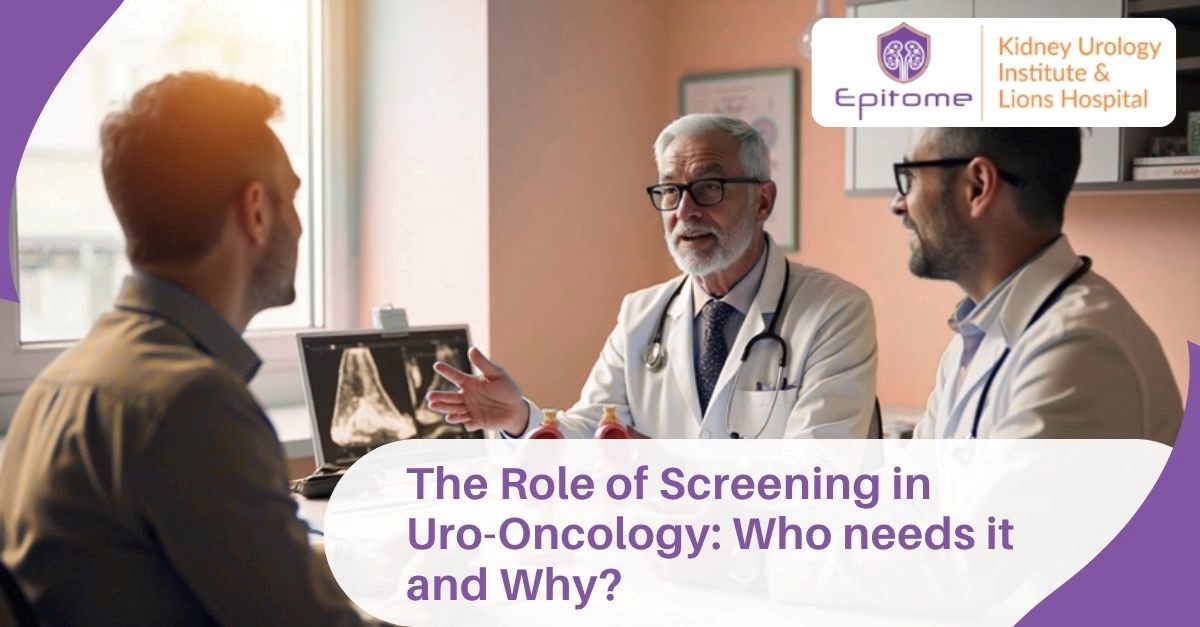Uro oncology screening saves lives, particularly when considering that urological cancers are among the most common cancer types worldwide. According to Jain et al., the projected number of kidney cancer cases in India for 2020 was 51,979, as reported by the National Cancer Registry Program – National Center for Disease Informatics and Research. That year, India recorded 18,921 new kidney cancer cases and 10,231 related deaths.
What is Uro Oncology and Why Screening Matters
Uro oncology represents a vital medical subspecialty that focuses on diagnosing and treating cancers affecting the urinary tract and male reproductive organs. This specialized field addresses several life-threatening conditions that require prompt attention and expert care. Many patients benefit from early detection through consultation with an Uro Oncology Specialist in Delhi, especially in urban centers where access to expert care is readily available.
Understanding uro oncology meaning
Uro oncology combines urology with oncology to manage cancers of the bladder, kidneys, prostate, penis, and testicles. A urologic oncologist is a physician with specialized training in treating these specific cancers. These specialists work collaboratively with radiation oncologists, medical oncologists, and pathologists to provide comprehensive care for patients. Notably, urological malignancies impose a substantial burden on healthcare systems, becoming increasingly significant in aging populations. Prostate cancer ranks as the second leading cause of cancer-related deaths in men globally, following lung cancer, with approximately 1,466,680 new cases and 396,792 deaths worldwide reported in 2022.
Access to the Best Urologic oncologists in Delhi has enabled timely and advanced interventions, significantly improving patient outcomes through personalized care plans and innovative surgical techniques.
How screening fits into cancer care
Screening serves as a cornerstone in the early identification of urological cancers before symptoms appear. An effective screening program considers several parameters:
- The disease should be sufficiently prevalent or have a defined at-risk population
- The screening test must be sensitive and specific without causing additional health problems
- The test should detect early disease when intervention can influence outcomes
- It should be cost-effective
For instance, prostate cancer screening through PSA testing can detect elevated protein levels 10 years or longer before clinical symptoms develop. Additionally, bladder cancer screening may employ methods such as dipstick hematuria tests, which studies suggest can detect cancer at earlier stages. Many of these procedures are routinely offered at the Best Uro Oncology treatment Hospital in Delhi, ensuring access to world-class diagnostic care.
Why early detection saves lives
Early detection dramatically improves treatment outcomes and survival rates. When caught early, prostate cancer has a five-year survival rate of nearly 100%, compared to approximately 30% when distant metastases are present. Similarly, bladder cancer has a five-year survival rate of approximately 96% when confined to the bladder.
Furthermore, early-stage cancers typically require less aggressive therapies, reducing complications and improving quality of life. Studies indicate that treating cancer at early stages may require less intensive and less costly interventions compared to advanced-stage cancers. Therefore, timely diagnosis through appropriate screening methods proves crucial in improving overall cancer outcomes and reducing mortality rates.
Who Should Get Screened for Urological Cancer
Identifying individuals at elevated risk for urological malignancies allows for timely screening interventions. Certain demographics and conditions substantially increase the likelihood of developing urological cancers, making targeted screening crucial for early detection.
Men over 50 and prostate cancer risk
Age remains a primary risk factor for prostate cancer, with most cases diagnosed in men over 50. The American Cancer Society recommends that men at average risk discuss prostate cancer screening with their healthcare provider starting at age 50. This timing is critical as the lifetime risk of being diagnosed with prostate cancer is approximately 11%, while the lifetime risk of dying from prostate cancer is 2.5%. The median age of death from prostate cancer is 80 years, with more than two-thirds of all prostate cancer deaths occurring in men older than 75. Given these statistics, regular screening becomes increasingly important as men age.
People with family history of urology cancer
Genetic factors play a considerable role in urological cancer risk. Men with a first-degree relative (father or brother) diagnosed with prostate cancer before age 65 should begin screening discussions at age 45. Those with multiple first-degree relatives affected by early prostate cancer should consider screening even earlier—at age 40. Research indicates that having a first-degree relative with bladder cancer significantly increases risk (OR 2.72). Moreover, bladder cancer risk rises with the number of cancer-affected first-degree relatives. Interestingly, having family members with non-urologic cancers also elevates bladder cancer risk (OR 1.61).
Those with recurring UTIs or kidney stones
Persistent urological conditions correlate with increased cancer risk. Studies reveal that patients with urinary calculi face a higher risk of developing renal pelvis/ureteral cancer (SIR 2.5) and bladder cancer (SIR 1.4). A comprehensive Taiwan study demonstrated that individuals with urinary stones had significantly elevated risks for kidney cancer (SIR 4.24) and bladder cancer (SIR 3.30). Early evaluation at the Best Uro Oncology treatment Hospital in Delhi can help differentiate between benign and potentially malignant conditions.
Men with erectile dysfunction or urinary symptoms
Lower urinary tract symptoms (LUTS) and erectile dysfunction often serve as early indicators of potential urological issues. Research shows a significant correlation between these conditions, with 57.6% of men with LUTS also experiencing ED, compared to only 29.7% of asymptomatic men. Importantly, LUTS is an age-independent predictor of ED (odds ratio=2.72). Both conditions may signal underlying urological problems requiring evaluation, as ED is frequently observed in patients with various urological cancers.
Screening Methods for Different Urological Cancers
Effective screening methods serve as frontline tools in urological cancer detection, enabling physicians to identify malignancies before symptoms appear. Each type of urological cancer requires specific screening approaches tailored to the affected organ.
PSA test and digital rectal exam for prostate cancer
The prostate-specific antigen (PSA) test measures protein levels in blood that may indicate prostate abnormalities. Most men without prostate cancer have PSA levels under 4 ng/mL, while levels between 4-10 ng/mL indicate a 1 in 4 chance of cancer. PSA levels above 10 ng/mL suggest a cancer probability exceeding 50%. Alongside PSA testing, the digital rectal exam (DRE) involves a physician inserting a lubricated, gloved finger into the rectum to feel for prostate abnormalities. Although less sensitive than PSA testing, DRE can detect cancers in men with normal PSA levels, making it a valuable complementary screening tool.
Cystoscopy and urine cytology for bladder cancer
Cystoscopy serves as the gold standard for bladder cancer detection. During this outpatient procedure, a thin, lighted tube (cystoscope) passes through the urethra into the bladder, allowing visualization of the bladder lining. If abnormalities appear, physicians may take tissue samples for biopsy. Urine cytology examines urine samples under a microscope to identify cancer cells. This non-invasive test offers 42-86% sensitivity with 73-96% specificity, depending on the study. A consultation with an Uro Oncology Specialist in Delhi ensures that these tests are administered based on risk assessment and clinical findings.
Imaging tests for kidney cancer
Kidney cancer diagnosis typically employs several imaging modalities. Computed tomography (CT) represents the preferred method, detecting and staging renal cell carcinoma in a single examination. Magnetic resonance imaging (MRI) serves as an alternative when CT contrast is contraindicated due to allergies or kidney dysfunction. Ultrasound can help characterize small lesions, distinguishing fluid-filled cysts from solid tumors.
Self-exams and ultrasound for testicular cancer
Monthly testicular self-examination represents a simple yet effective screening approach. Best performed during a warm shower when the scrotum is relaxed, the exam involves gently rolling each testicle between thumbs and fingers to detect lumps, swelling, or hardness. Although testicular cancer is often painless, any abnormalities warrant prompt medical evaluation. Patients concerned about symptoms can consult with an Uro Oncology expert in Delhi NCR to receive a proper evaluation and peace of mind.
Lifestyle and Prevention: Supporting Early Detection
Beyond screening tests, lifestyle modifications serve as crucial preventive measures against urological cancers. Adopting certain health practices not only reduces cancer risk but also supports early detection by minimizing factors that can mask symptoms.
Diet and hydration for kidney and bladder health
Proper hydration plays a fundamental role in maintaining urological health. Women should aim for eight 200ml glasses while men need ten 200ml glasses of fluid daily. Adequate water intake helps flush toxins through urine, potentially lowering chronic kidney disease risk. For kidney stone prevention, staying well-hydrated dilutes urine and reduces concentration of potential carcinogens. A balanced diet rich in fruits, vegetables, whole grains, and lean proteins further supports urological health. Limiting sodium intake remains essential, as excessive consumption contributes to fluid retention and increased risk of kidney stones.
Avoiding smoking and alcohol
Smoking represents perhaps the single most important modifiable risk factor for bladder cancer. Current smokers have more than threefold increased risk compared to non-smokers, while former smokers maintain approximately twofold increased risk. Genetic predisposition to cigarettes per day, lifetime smoking index, and smoking initiation are positively associated with increased bladder cancer risk. Consequently, quitting smoking can significantly reduce likelihood of urological malignancies. Regarding alcohol, the evidence remains mixed—moderate drinking has not shown consistent associations with increased urological cancer risk, though heavy drinking (HR 1.30) has been linked to bladder cancer.
Exercise and weight management
Regular physical activity supports urological health through multiple mechanisms. Exercise improves circulation to urinary organs, strengthens pelvic floor muscles, and helps maintain healthy weight—all factors in cancer prevention. Moreover, obesity is a known risk factor for several urological cancers, including kidney and prostate cancers.
Safe sex practices to reduce HPV-related risks
HPV infection represents a significant risk factor for certain urological cancers. Indeed, penile cancer is often caused by HPV, with HPV-16 being the most frequent type (68.3%). Practicing safe sex and considering HPV vaccination can substantially reduce urological cancer risk, as the virus has been linked to increased risk of prostate, bladder, testicular, and kidney cancers.
Best Kidney Disease Hospital in Delhi: Epitome Hospital
When it comes to expert care in kidney diseases and urological cancers, Epitome Hospitals stands out as one of the Best Kidney Treatment Hospital in Delhi. With a dedicated department for nephrology and uro oncology, Epitome Hospitals provides comprehensive diagnostic, surgical, and post-treatment care tailored to individual patient needs.
Key Highlights of Epitome Hospital:
- Including high-resolution imaging (CT, MRI, Ultrasound) and renal function testing.
- A collaborative approach involving leading nephrologists, urologists, and oncologists.
- Expertise in laparoscopic surgeries for kidney and bladder cancers.
- Personalized treatment plans, nutritional counseling, and long-term follow-up for chronic kidney disease and cancer recovery.
- Rapid response for acute urological or nephrological emergencies.
Conclusion
Early detection and access to the right treatment center can mean the difference between life and death. As one of the Best Uro Oncology Treatment Hospitals in Delhi, Epitome Hospitals is committed to providing cancer screening, diagnosis, and treatment under the care of some of the Best Urologic Oncologists in Delhi.
If you fall into a high-risk group—such as men over 50, individuals with a family history of urological cancers, or those experiencing recurring urinary symptoms—do not delay screening. By combining regular checkups, lifestyle changes, and access to specialized care, you can significantly improve your chances of successful treatment and long-term survival.
Take a proactive step towards your health.
Schedule an appointment with the best urologic oncologists at Epitome Hospitals, Delhi.
Call now or visit our website to book online.

